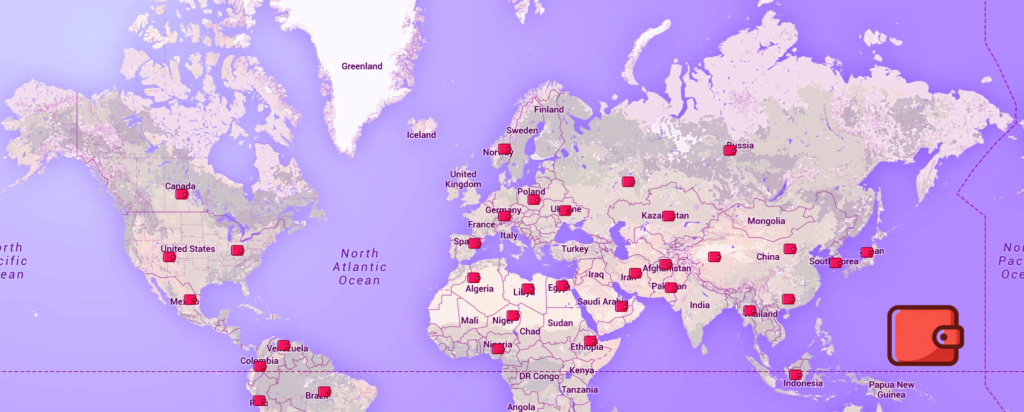
In the fast-changing realm of cryptocurrency, sticking to rules is not only a legal must but also crucial for trust and honesty. Using geolocation tools well can assist crypto businesses in spotting and stopping transactions linked to sanctioned people or groups. Incorporating these tools into their compliance methods allows Red Wallet and other crypto businesses to enhance checks and demonstrate their commitment to following rules. Therefore, crypto businesses must view these tools as a central part of their OFAC compliance plan.
Understanding OFAC’s Stance on Cryptocurrency
OFAC is closely monitoring the use of cryptocurrencies for money laundering and sanctions evasion. In addition, in its efforts to address these concerns, OFAC has emphasized various measures to mitigate associated risks. As a result, this is where geolocation tools come into play in the red wallet.
The Role of Geolocation Tools in Compliance
Geolocation tech helps identify and block access from IP addresses in sanctioned locations. Thus, a crypto exchange, wallet service, or any crypto platform can limit access from countries under U.S. sanctions, reducing the risk of accidental rule violations.
Key Functions of Geolocation Tools:
- Blocking Access from Sanctioned Jurisdictions: By identifying a user’s location, geolocation tools can prevent access from high-risk or sanctioned areas, safeguarding a platform’s services.
- Enhancing Due Diligence: These tools enhance the due diligence process by adding extra layers of user verification and risk assessment.
- Compliance with Regulatory Requirements: Employing geolocation tools is not only a best practice but increasingly a regulatory expectation, as outlined in OFAC’s guidance.
Case Studies: The Impact of Geolocation Tools
A clear instance showing why geolocation tools matter is the action taken against BitPay. They got in trouble for not stopping transactions from users in places like Crimea, which had sanctions. Even though they had the info about where users were, they still faced penalties. This situation highlights how important it is to use good geolocation technology in compliance plans.
Challenges and Solutions in Implementing Geolocation Tools
Challenges:
- Accuracy and Reliability: Ensuring accurate geolocation data is crucial, as users may use VPNs and other methods to hide their true location.
- Balancing User Privacy and Compliance: Finding the right balance between user privacy concerns and regulatory compliance is essential.
Solutions:
- Advanced Geolocation Technologies: Using advanced geolocation tools to detect and reduce the use of VPNs, proxies, and other identity-hiding methods.
- Continuous Monitoring and Updating: Always updating geolocation databases and monitoring tools to stay current with new technologies and changes in rules.
RedWallet: Enhancing Compliance with Geolocation Tools
Using these tools like Redwallet, in the cryptocurrency world is very important nowadays. In the cryptocurrency market, there are many rules to follow. If businesses use advanced geolocation technology, they are in a better position to follow the rules from OFAC. Taking these steps not only reduces the chances of breaking the rules but also makes businesses look good in the eyes of regulators and customers, which builds a strong reputation.
To sum it up, as digital currencies become more aligned with rules, these tools are very important for following those rules. Cryptocurrency businesses need to use these technologies to operate legally and create a safe and trusted environment for their users.
Check out: Safe P2P Trading with Red Wallet
Mastering P2P Crypto Trading
Frequently Asked Questions (FAQs)
OFAC stands for the Office of Foreign Assets Control. It’s really important in crypto because it makes rules to stop money laundering and funding for bad stuff like terrorism.
Geolocation tools help crypto businesses by figuring out where their users are. This way, they can stop people in certain places, where there are strict rules, from using their services.
The main challenges are making sure the location info is right, especially when people use things like VPNs, and keeping user privacy while still following the rules.
Crypto businesses can use advanced geolocation tech that respects privacy but still, spots when users try to hide their real location. They need to keep updating their tools and methods too.
Following OFAC rules is key because it keeps the platforms safe from being used for illegal stuff. It also makes users and the government trust them more.



4 thoughts on “Geolocation Tools in Crypto: A Key to OFAC Compliance”